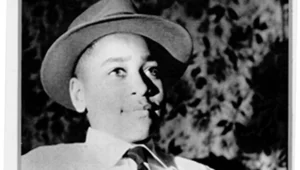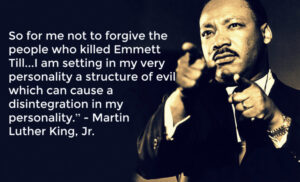Forgiveness in the Face of Murder. Emmett Till and Martin Luther King Jr.’s Call For Forgiveness.
Colossians 3:12, “12 Put on then, as God’s chosen ones, holy and beloved, compassionate hearts, kindness, humility, meekness, and patience, 13 bearing with one another and, if one has a complaint against another, forgiving each other; as the Lord has forgiven you, so you also must forgive.” (CSB).
“And I wonder why it is that the forces of evil seem to reign supreme and the forces of goodness seem to be trampled over. Every now and then I feel like asking God, Why is it that over so many centuries the forces of injustice have triumphed over the Negro and he has been forced to live under oppression and slavery and exploitation? Why is it, God? Why is it simply because some of your children ask to be treated as first-class human beings they are trampled over, their homes are bombed, their children are pushed from their classrooms, and sometimes little children [such as Emmett Till] are thrown in the deep waters of Mississippi?”[1] (Martin Luther King, Jr.)
In August of 1955, a teenager from Chicago named Emmett Till was visiting his relatives in tiny Money, Mississippi. Till and a few friends skipped church one Sunday morning and went to Bryant’s Grocery store downtown to purchase some candy. While at the store, Till allegedly showed his friends a picture of his school class in Chicago, which was integrated, with white and black students in the same classroom. This, along with Till’s statement that he had white friends, was shocking to his companions in the segregated south, who may have challenged him to talk with Carolyn Bryant, the young shopkeeper that was tending to Bryant’s Grocery store that morning. Later, Bryant apparently told her husband and some other relatives that Emmett had flirted with her, testifying in court that he had grabbed her hand and said, “How about a date, baby?” This testimony, which was later proven to be fallacious, so incensed Bryant’s husband Roy, and his half-brother J.W. Milam, that they went and kidnapped Emmett and then tortured and killed him. Witnesses later testified that Till was heard crying out, “Mama, Lord have mercy…Lord have mercy,” as he was beaten to death. Afterward, Till was shot in the head and brutally beaten all over his body, so badly that his eye was dislodged from its socket when he was found and pulled from a river, where he had been tied to a 75-pound piece of metal and drowned.

Imagine the kind of seething hatred, combined with a lethal mixture of pride and ignorance, that could have produced such an outcome. Such a horrific act demands justice and provokes righteous anger. And that is why I am so fascinated by the response of Dr. Martin Luther King Jr. to the brutal murder of Emmett Till. Rather than call for riots, destruction, bitterness, and rage, he called for…forgiveness?! Yes, you read that correctly. Dr. King, though no doubt believing that justice should be done to the murderers of Emmet Till, also called for forgiveness when he was interviewed for the newspaper of Bennett College in North Carolina:
Interviewer: “Doctor King, I have just a few questions. Now you talk about forgiveness and that you must forgive. Do you find that really in your heart you can forgive the men who, say, killed Emmett Till or castrated this innocent man?”
Dr. King: “Well, if you really love on the basis of Christian concepts, forgiveness is very difficult. It isn’t easy. And when it becomes so easy it really isn’t forgiveness. There is pain and agony. A husband who loves his wife or vice versa, when one makes a tragic mistake, they can’t forgive easy. But it’s possible…But forgiveness has great psychological value. Not only does it have healing social power but it has psychological power. If I’m bitter toward a man it hurts me as much as it hurts him. And I think psychologists are telling us today that hate not only hurts the hated but it hurts the hater as much. So for me not to forgive the people who killed Emmett Till or the people who mutilated the man in Birmingham, I am setting in my very personality a structure of evil which can cause a disintegration in my personality.”[2]
This response demonstrates a tremendous amount of wisdom by Dr. King Jr. He knows forgiveness isn’t easy nor cheap, but he also knows that hanging on to bitterness and withholding forgiveness will lead to more harm than help.
Forgiveness is hard, but can you imagine how hard it must have been for Dr. King Jr. to issue this call for forgiveness in the face of repeated injustices? Later, he wisely points us to both the reason for forgiveness and the power that fuels forgiveness. We began this post with what appeared to be a despairing quote from Dr. King Jr., but you will see that the full quote radiates great gospel hope as you read the rest of his statement:
Why is it, God? Why is it simply because some of your children ask to be treated as first-class human beings they are trampled over, their homes are bombed, their children are pushed from their classrooms, and sometimes little children are thrown in the deep waters of Mississippi? Why is it, oh God, that that has to happen? I begin to despair sometimes, it seems that Good Friday has the throne. It seems that the forces of injustice reign supreme. But then in the midst of that something else comes to me. And I can hear something saying, “King, you are stopping at Good Friday, but don’t you know that Easter is coming? (Yeah) Don’t worry about this thing! You are just in the midst of the transition now. You are just in the midst of Good Friday now. But I want you to know, King, that Easter is coming! One day truth will rise up and reign supreme! One day justice will rise up. One day all of the children of God will be able to stand up on the third day and then cry, ‘Hallelujah, Hallelujah’ because it’s the Resurrection day.”[3]
Dr. King Jr. saw it clearly – forgiveness, even for the most heinous crimes, is possible because of the resurrection. We forgive, says the apostle Paul in Ephesians 4:32, because God in Christ forgave us. If you are holding on to a wounding that somebody has unjustly done to you, be reminded today of the example of Martin Luther King Jr., who called for forgiveness in the most radical way possible. And, be further remanded of the example of Jesus, who, “while we were yet sinners,” died for us and forgave us. (Romans 5:8, CSB).

[1] Martin Luther King and Susan Carson, The Papers of Martin Luther King, Jr, Volume VI. (Berkeley, CA: University of California Press, 2007), 289.
[2] Donald W. Shriver, Isaac B. Sharp, and Christian Iosso, Christian Ethics in Conversation: A Festschrift in Honor of Donald W. Shriver Jr., 13th President of Union Theological Seminary in the City of New York / Edited by Isaac B. Sharp and Christian T. Iosso ; Forewords by M. Craig Barnes and Serene Jones (Eugene, OR: Cascade Books, 2020), 111.
[3] Martin Luther King and Susan Carson, The Papers of Martin Luther King, Jr., 289.



Comments
Leave a Comment